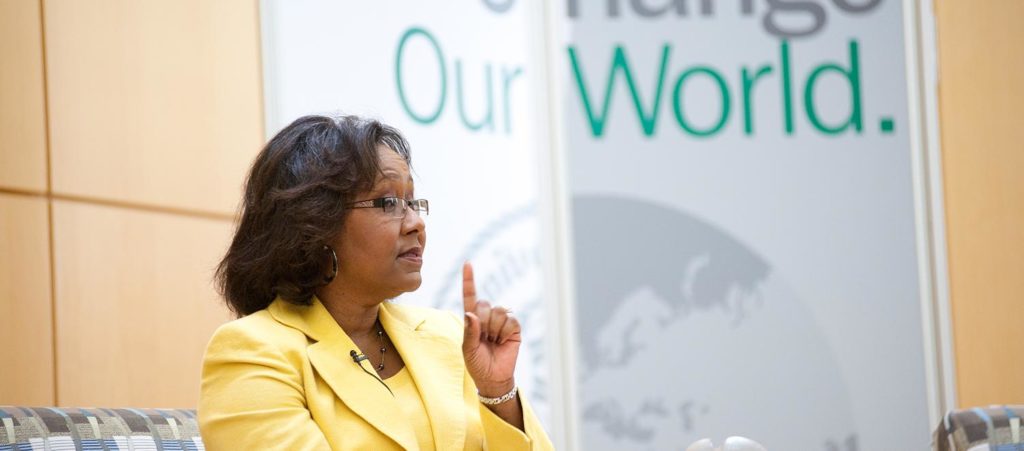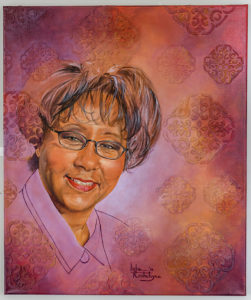
Stephanie Coursey Bailey ’72, M.D., insists she’s an introvert. It’s an odd admission for someone whose professional trajectory has required her to make bold decisions to improve health outcomes for the underserved and overwhelmed.

But as you speak with Dr. Bailey, it’s clear that her introversion is not about a reluctance to be heard as an individual, but rather a preference to defer to the voice of the community.
Indeed, she’s shaped her career by listening to that collective voice and, placing herself on the front line of health challenges on the local, regional, and national levels. She’s been a lifetime champion of good health for all, ever aware that public health professionals and organizations are positioned to tackle health-related problems that are beyond the control of any one person.
•••••
As a fledgling physician in 1981, Bailey had expected to work one-on-one with patients in underserved communities. But the terms imposed by her National Health Service Corps medical school scholarship required her to be assigned to a community health clinic and later take a job at the Department of Health for Nashville/Davidson County. When Bailey confided some regret over that turn of events to her new supervisor, she received a reply that changed her life.
Story from Clark Magazine, summer 2018
“My director reminded me that in my new position what I did affected the lives of approximately 35,000 people,” she recalls. “That response clicked for me. That was when I caught the public health bug.” She would go on to complement her M.D. with a master’s degree in health service administration.
With her professional focus clarified, Bailey set out to take the lead in public health practice.
“As a public health practitioner, the community is my patient,” she explains. “I’m looking for those common denominators that are making people sick or preventing them from living a normal life span: the environmental and social determinants that contribute to disease.”
Bailey eventually assumed the role of director of health for Nashville, a position she held for 11 years. Her directive was unequivocal.
“I would tell my staff, ‘If we’re not on the cutting edge, we’re taking up too much space,’” she says. “Being anticipatory, and trying to do the next best thing for the community, always propelled me to create an environment where innovation thrives.”
As chief administrative officer of the Nashville Board of Health, where she oversaw an annual budget of more than $40 million as well as 579 employees, she initiated and shepherded a wide range of health-promoting programs, established divisions of epidemiology and research and evaluation, and created Health Nashville 2000+ to engage the community in strategic health planning.
Under Bailey’s watch, syphilis was virtually eliminated in Nashville after the city had ranked No. 1 in the nation for incidence of the disease. Her eradication efforts were recognized by the U.S. Centers for Disease Control as a national model. She spearheaded Bridges to Care (now Project Access Nashville), which linked approximately 26,000 uninsured residents to health care through a public/private consortium of hospitals, clinics, and other health care providers.
Recognizing that youth input is important to a community’s prosperity, she appointed the first Youth Advisory Board in the city.
“Communities,” she says, “should own their own health instead of being dictated to from the top down.”
Bailey’s belief in the power of community springs from a childhood spent in a segregated neighborhood in Denton, a small town bordered by the Choptank River on Maryland’s eastern shore, where her father operated a combination restaurant and beer garden. She recalls impromptu gatherings on front porches, Sunday afternoon baseball games, and going crabbing with her father. Children were expected to mind their manners and respect adults. She came away with a deep appreciation for her neighborhood of close-knit families.
“I don’t think people in this society stay still long enough to really assess why they make the decisions they do.”
“It was a small town that espoused values of community connectedness,” she says. “We were pretty much self-contained, with our own store, taxicab, and gas pumps. I walked to our segregated school. And we were reared to aspire to be optimistic and hopeful. We did pretty well.”
Bailey first learned about Clark University from a high school guidance counselor who knew another Clark student from Maryland’s eastern shore, Mareasa Isaacs ’70.
Once on campus, Bailey had no thought about becoming a doctor, although she complemented her psychology major with lots of courses in the sciences. Two of those courses — organic chemistry with Edward Trachtenberg, and anatomy with Rudolph Nunnemacher — pointed her in the direction of a medical career.
“I remember Dr. Trachtenberg pulled me aside after class and said, ‘Stephanie, you should go to medical school.’ It had never entered my mind,” Bailey says. “If it weren’t for him seeing that potential and planting that seed, I never would have even applied.”
She also recalls taking a couple of the creatures she examined in Nunnemacher’s class home to show her parents. “I enjoyed the class to the point where, when I traveled by bus down to Maryland, I actually wrapped up the shark and cat that I had dissected to show my parents. Dr. Nunnemacher gave me that kind of excitement for appreciating the body and the organs. Little did I know that would bode well in medical school.”
Bailey enjoys many good memories of her college years, both at Clark and at Nashville’s Meharry Medical College, the country’s second-oldest historically black medical school, where she earned an M.D. The days she received her diplomas were extra-special, and not just because of the degrees conferred.
“I was the first person in my family to graduate from college,” she says. “My family from Philadelphia, New York, and Maryland chartered a bus and came up for my graduation from Clark. They chartered two buses to come to my graduation from medical school. That was joyous.”
•••••
At 67, she is as passionate about public health as she was in her early Nashville days. Bailey insists that community efforts cannot solve everything, and is quick to note that adopting a healthy lifestyle is essential. After working for 25 years to make Nashville a healthier city, Bailey served as chief of public health practice at the Centers for Disease Control from 2006 to 2011, a position charged with strengthening the U.S. public health system, building and supporting public health infrastructure, and improving overall public health system performance.
Once again, she was working in the vanguard of community health, except now her community was the entire country. After her tenure with the CDC, she moved into academia as interim dean of public service and urban affairs, later dean of the College of Health Sciences, at Tennessee State University. Today she serves as senior associate dean of public health practice at Meharry.
“The diseases that are killing us now are chronic diseases, of which seven out of the top 10 are preventable,” she says. “If we do more prevention we will have less burden of disease. That’s the health promotion part of public health. That’s education. But prevention isn’t relegated to the doctor to fix. It’s about our choices, our habits, and our cultural norms.”
Bailey points out that while access to care is vital, about 50 percent of health problems are attributable to lifestyle behavior. She’s the first to admit that making healthy choices is difficult.
“Take me,” she says. “I certainly know better, but if I eat one Oreo, I’ve eaten the whole row before I stop. My genetics tells me I’m going to have hypertension and heart disease. The only things in my control are diet and exercise. They’re very hard things to do.
“Why is prevention so hard?” she asks. “It’s because the culture and experiences we grew up with lead to beliefs, which lead to actions, which lead to results. We as a society always focus on the actions — to change the law to do something now. But that does not change the underlying behavior that will create a culture where health is the default. That takes a lot more effort.”
Most recently, Bailey’s interest in promoting prevention has spurred her to become a certified life coach. She’s keen to understand what gives a person the motivation to stick with healthy choices, and has concluded that two of the secrets are positive “self-talk,” and “being still.”
“The key is learning how to turn the talk we all have with ourselves into affirming conversations,” she says. “Then you’re more empowered to do better. Because we know better, and we have an obligation to do better.
“I don’t think people in this society stay still long enough to really assess why they make the decisions they do. What are your core values; what are they based on? I’m not sure people are that aware of themselves anymore because of the busyness of our lives.”
Bailey has discovered the importance of getting a patient to an “aha” moment by listening to their story. At some point, most people will come up with the moment that inspires them to change.
“When they do that,” Bailey says, “it means much more than me telling them something. Then, I can take them to the next step. This part of coaching is what I call the art of medicine. It’s a lot more work than just prescribing a pill. Doctors have about 15 minutes for each appointment, and everyone comes in with two or three issues. The system does not incentivize quality as much as it does volume.”
As a physician, public health professional, and life coach, Bailey says the key to good health requires individual responsibility working in tandem with community-based action. Her goal is always to “lift people up so they can soar.”
•••••
Since 1981, Bailey and her husband, W. T. Bailey Jr., have lived on a farm in West Nashville, where they’ve raised three children — as well as walking horses and pigs (she notes one very productive sow had a litter of 21 piglets in the dead of winter that had to be brought indoors and bottle-fed). There’s plenty of room for family gatherings, which now include spouses and four grandchildren.
She is working with Bamboo Doors Studios to create a documentary about her Denton childhood, integrating extensive footage shot by her father. The film, “Through My Father’s Eye” (an allusion to the fact that her father had only one functioning eye), is premiering at four locations this year: Nashville (April), Denton (July), Atlanta, and Houston (both in August).
“My father had an old Bell and Howell 8mm movie camera, which he used to capture how we lived, played, and worked,” she says. “The film is about the community values that came out of our living together, and trying to transport those values to the present so we can reclaim, recapture, and preserve communities.”
There’s little doubt the film will be a wonderful piece of cinema. Bailey’s best friend and fellow Clarkie, Mary Williams ’72, knows firsthand what her friend is capable of.
“Stephanie didn’t get to where she is without being very determined,” says Williams. “She’s a bigger-than-life person. If she puts her mind to something, there’s nothing that’s going to stop her.”


